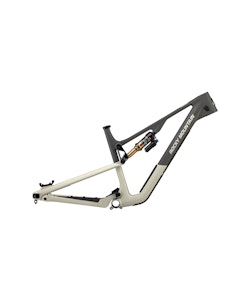Mountain Bike Frames
The frame is the heart and soul of your mountain bike. It’s also the backbone, which is why we carry a wide variety of mountain bike frames to help you build your dream machine. The first choice to make when shopping for a frame is whether you want a hardtail mountain bike or full-suspension mountain bike. This comes down to your riding style and terrain. Advancements in suspension technology over the years have made full-suspension frames the popular choice for most off-road situations, ranging from XC and trail to enduro and gravity riding.
Hardtail mountain bikes, on the other hand, are a great choice if you typically ride smooth, flowy singletrack or fire-road terrain where climbing and efficiency matter most. Hardtail frames are typically much lighter than full-suspension frames. Hardtails are also a great choice for building up multi-purpose adventure bikes that can handle everything from weekend bike-packing trips to daily urban shredding.
Once you’ve chosen between full-suspension or hardtail, it’s time to get specific with frame materials, geometry and other details that will affect ride performance and price points. Your main choices for mountain bike frames are steel, aluminum, titanium, and carbon fiber. Aluminum is the most commonly used material. It is lightweight, inexpensive, and are stiff. Steel bicycle frames ride smoothly, are incredibly durable and long-lasting, but are not as stiff as aluminum frames. Titanium isn't commonly used anymore with bicycle frames but those that ride titanium frames tend to never go back. Lastly, carbon fiber is the material used in almost all premium frames. Carbon fiber mountain bike frames are lightweight, have an excellent strength-to-weight ratio, ride smoothly, and are stiff. All hardtail carbon mountain bikes will have a full carbon layup, however, some full suspension carbon frames will only have a carbon front triangle while the swingarm on the rear is aluminum. Make sure you do your research to know which frame material is best for your style of riding. For more information on frame materials, check out our Mountain Bike Frame Materials 101 article.
Frame geometry varies depending on the type of riding you do and also the suspension setup. Most mountain bike frames are optimized for a specific amount of front suspension (or at least a general range), so it’s important to know what type of suspension fork you’ll be using. Racy XC frames are typically engineered for shorter travel forks (90-120mm). Trail frames usually fall in the 120-160mm range, and enduro and DH frames are made for longer travel forks, 160mm and up.
If you’re looking at full-suspension MTB frames, the rear suspension system is probably your first consideration. For more on this topic, check out our Mountain Bike Suspension 101 article. At JensonUSA.com, we carry a full selection of top frames for sale like Ibis, Intense, Kona, Niner and Yeti. Each has their own unique approach to suspension engineering and design, so take a look at their offerings and feel free to call one of our Gear Advisors today at 888-880-3811 if you have any questions.



















































































































































































































